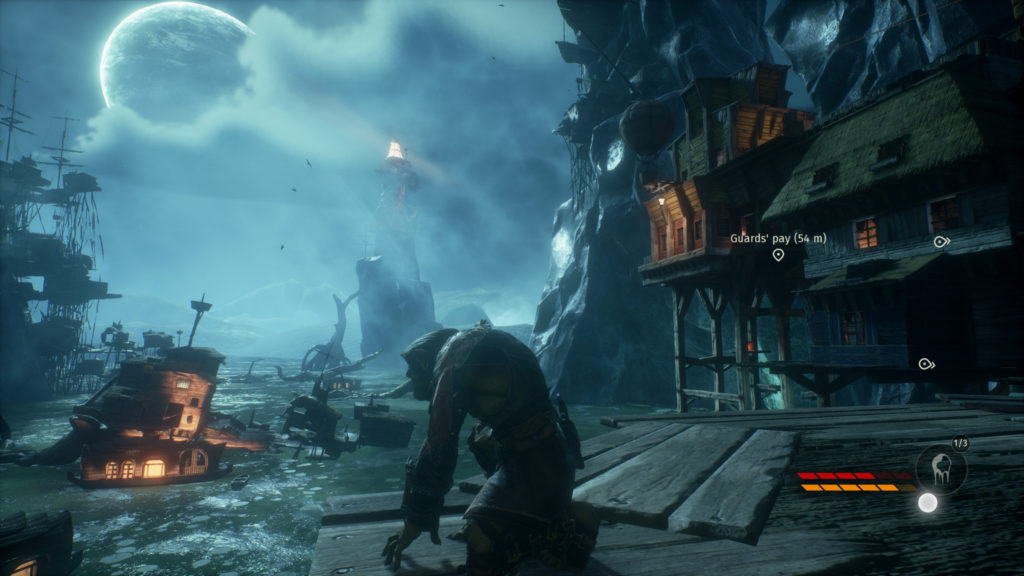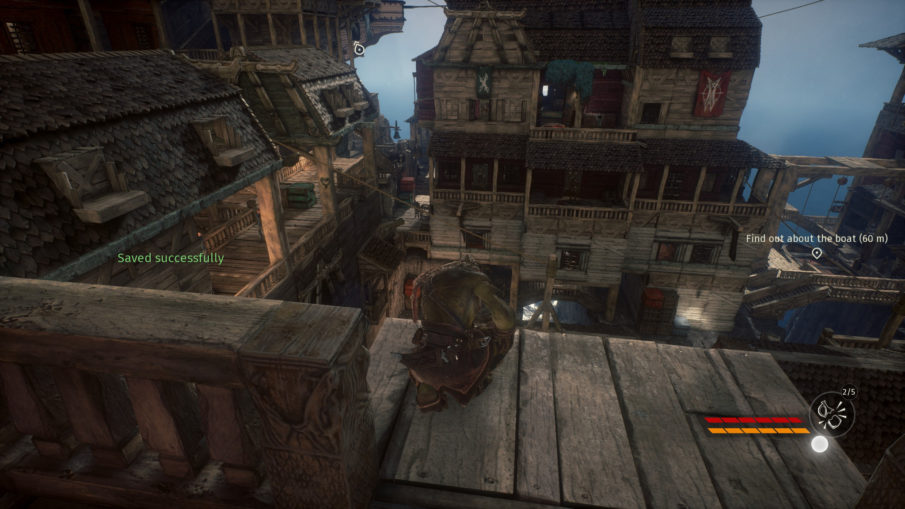Windows •
Though my 2014 review of Cyanide‘s goblin stealther has disappeared beneath the waves aboard a now-defunct website, my opinion on the Styx franchise has only strengthened with this year’s Shards of Darkness. This brand of dark French fantasy might be left wanting in the narrative presentation stakes, but as an unfettered vertiginous romp worthy of grizzled Garrettians, the goblin is as good as it gets.
You play as Styx, a foul-mouthed grot with a taste for amber and a thirst for revenge. The goblin finds himself in the thick of a suspicious detente between the dark elves of Körangar and the Dwarves, precluded by a brush with death at the hands of a shape-shifter. Squats, the elven aloof and all manner of beasts pepper a tale whose real star isn’t the story.
Cyanide have reached a little higher with Shards after Master of Shadows, but as was with the first, it’s not particularly gripping. Styx himself, though a refreshing protagonist in terms of justification and design, undermines plot severity with a bizarre doubling-down on pop culture non-sequitur references and edgy swearing. Think back to Thief and the use of ‘taffer‘ and how effectively it was deployed. Shards of Darkness’ biggest weakness feels a frank mismatch of script and world. From the days of Styx’s debut in Of Orcs And Men to now, misapplied edginess in writing has been a consistent flaw.
BUT. But, but, but.

If you can look past its script, Shards of Darkness delivers on the promise of open-world old school stealth with immense environmental clout. It touts cavernous, layered levels of nooks, crannies, alleys, shadows, towers, gantries, antechambers and every other name you can pluck from a medieval architecture reference book. They’re delicious constructs, and where Hitman might shine in its depiction of heavily-populated, highly-detailed locales, Shards of Darkness has labyrinthine complexity down to a fine art.
This is why I’m not fussed over the narrative shortfalls. The locations are riveting, if Cyanide’s brand of scurrying and scaling is your bag. Master of Shadows touched on the magic, but feels in comparison like a prototype to Shards of Darkness’ vision. Seeing pulp-Renaissance airships drift about the Körangar gate is inspiring stuff, let alone the ability to stalk about their confines high above the clouds. Lurking in scullery rafters and under tables. Playing the old games of attracting a pair of patrolling guards, then dropping a chandelier on their unfortunate heads. The sly, tense moments of overpowering a guard in a stairwell and the crackling of vertebrae that just might reach the ears of their comrades. All of this is here without the autopilot of modern design.
The lack of hand-holding or magnetic mantling means Shards of Darkness plays somewhat like a fine collision of PS2-era platformer and Thief: The Dark Project. Shards of Darkness feels much tighter than its forebear in regards to bouldering about the game’s expansive levels. There’s fallibility to scaling, which might frustrate the hell out of some players, but will thrill others. It’s as if Looking Glass Studios made a Sly Cooper game. Moreover, while there’s a comprehensive character skill tree and crafting to see to, you can play this one with as little of it as you like. I rarely use any of the skills, bar the odd scaling hardpoint vision mode. Completely optional and wholly appreciated.

While story and script see Cyanide stay the middling course, Styx: Shards of Darkness takes environmental complexity to, ahem, the next level. Despite dealing in immense fantasy, locations feel governed and anchored by logical layout. They’re a treasure to traverse.
Don’t let this slinker give you the slip.



Start the discussion at discourse.statelyplay.com